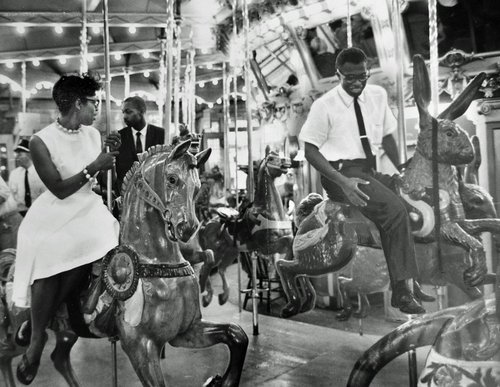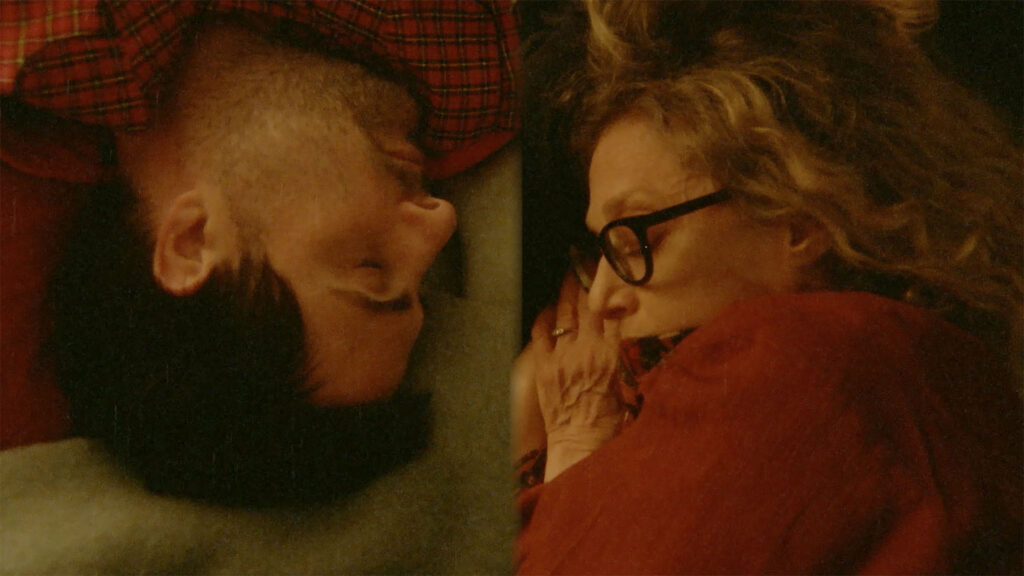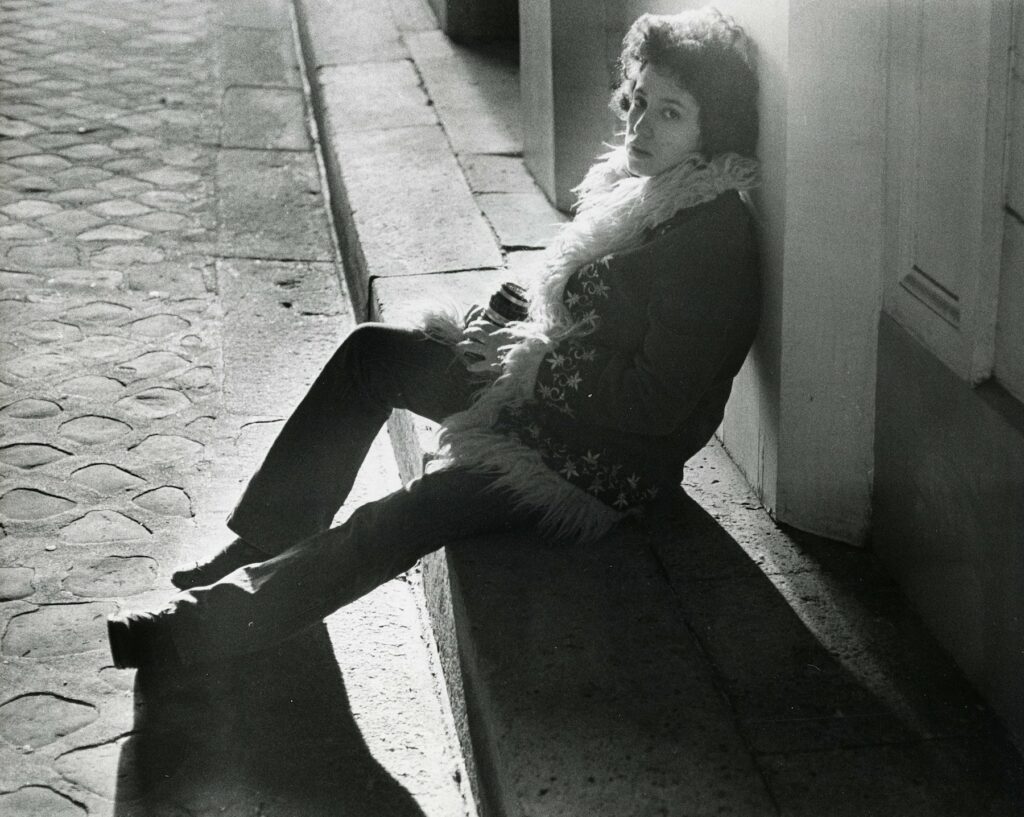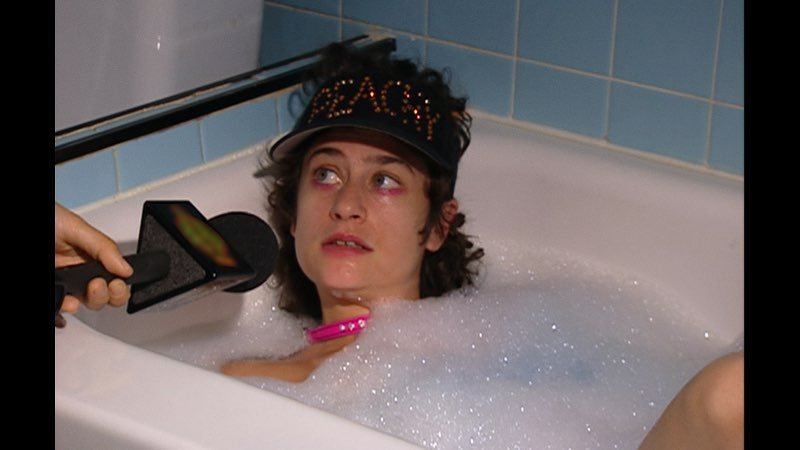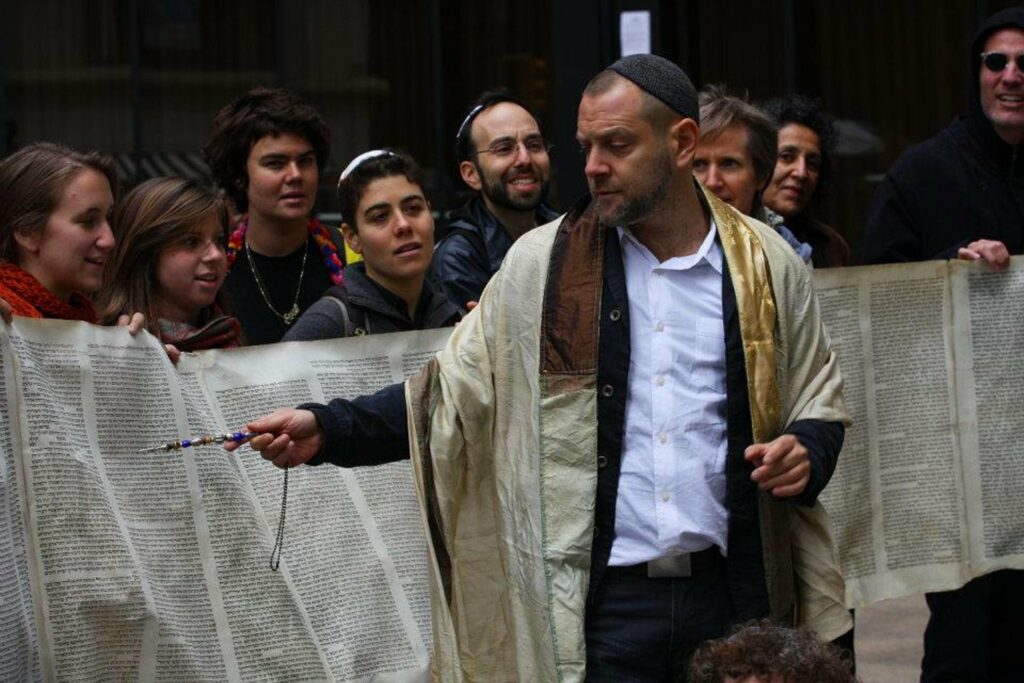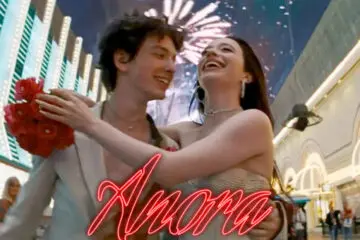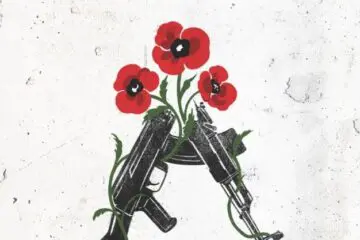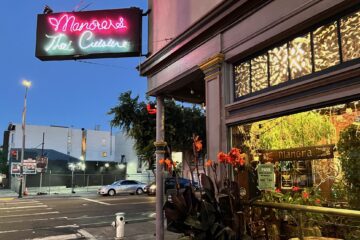S.F. Jewish Film Festival is Here and It’s Excellent
The 44th San Francisco Jewish Film Festival (hereafter SFJFF) reminds SF Bay Area filmgoers that there’s far more to being Jewish than their position regarding the Israeli government’s current actions against the Palestinians. Running from July 18 to August 4, 2024 at such Bay Area venues as the Roxie Theatre, the Jewish Community Center of San Francisco, and the Piedmont Theatre, SFJFF offers entertaining and even thought-provoking films involving Jews. Film subjects at this year’s festival includes a forgotten Civil Rights era sit-in, the life and career of singer-songwriter Janis Ian, a buddy comedy involving hallucinogenic mushrooms, and a Radical Faerie who’s also an Orthodox rabbi. And yes, there is a section of films devoted to the Israel-Palestine conflict.
For the record, this writer wished SFJFF had made room for the timely Berlinale award-winning documentary “No Other Land.” Then again, its subject matter and “no to forced expulsion of Palestinians” point of view would have made screenings a magnet for truly heated protests.
SFJFF 44 kicks off with Lisa D’Apolito’s documentary “Shari & Lamb Chop.” If you were a television-watching American kid in the 1950s and 1960s, you’re likely to be familiar with the work of ventriloquist Shari Lewis and her puppet sidekick Lamb Chop. D’Apolito’s film takes viewers into the incredible life and career of this pioneering children’s entertainer who amassed 13 Emmys and a Peabody. Was it a coincidence Lamb Chop regularly voiced ideas and views challenging the period’s ideas and assumptions about what women’s roles in society should be?
Peter Sillen’s documentary “Love Machina” involves a different sort of inanimate object given consciousness. The object in question is an AI humanoid named Bina48, and what will animate it will be the digitized consciousness of Bina Rothblatt. Partner Martine Rothblatt works with Bina on this project in hopes that its success will immortalize their love. But this project isn’t an outlier for the Rothblatts as the pair have made incredible contributions to both technology and art.
Documentary subject Jacob Appelbaum, on the other hand, has seen his cyberspace achievements (frontman for the Tor Project, vetting Edward Snowden for Laura Poitras’ famed documentary “Citizenfour”) overshadowed by his becoming an Internet pariah thanks to accusations of sexual assault and harassment. Jamie Kastner’s film “Nobody Wants To Talk About Jacob Appelbaum” follows its titular subject’s efforts to find out what happened to him – and why.
Texan misfit Reality Winner used to be a gun-owning vegan yogi. When she initially took an NSA contractor job, it was to support her ill father. However, when Winner ran across a government document showing Russia’s hacking of the 2016 U.S. presidential election, she thought she was performing a public service by leaking the document. Instead, she was charged with violating the Espionage Act. Susanna Fogel’s biopic “Winner” recounts the leaker’s story, and asks how far one should go to pursue the truth.
Jacob Kornbluth’s short documentary “We’ve Been Here Before” takes viewers back to punk subculture of the 1990s. In this subculture, nonconforming punks fought back against white nationalists and neo-Nazis who tried to appropriate the scene for their own.
In 1960, Washington, D.C.’s Glen Echo Amusement Park had an unchallenged Whites Only admittance policy. The park became the site of America’s first sit-in by Howard University students to end racial segregation. When the residents of a Jewish housing cooperative neighboring the park joined the Black students, the protests continued for ten weeks. Ilana Trachtman’s gripping documentary “Ain’t No Back To A Merry-Go-Round” recounts this forgotten story from the Civil Rights struggle.
John Hay’s documentary “Willem And Frieda” tells the amazing story of how writer/painter Willem Arondeus and cellist Frieda Belinfante pooled their artistic skills to create fake identity cards to save Jews from the Nazi death camps. Willem and Frieda would also take part in a daring raid on the Population Registry, which had duplicates of all identity cards. Could they and their fellow artists pull off the raid without harming anyone in the process?
Assaf Lapid’s documentary “The Return From The Other Planet” is a portrait of Auschwitz survivor Yechiel De-Nur, better known under his pen-name Ka-Tzetnik (“The Man From The Camps”) He kept using the pen-name until Adolf Eichmann’s 1961 trial. There, he revealed himself while giving testimony describing Auschwitz as a place outside of human judgment. The trauma of De-Nur’s experience would not be addressed until he underwent an experimental treatment using LSD where he revisited his Auschwitz experience as an SS officer.
Ready for a hallucinogenic buddy dramedy? Then you need to check out Veronica Kedar’s “Day Trippers.” Zoe and Ruth are two strangers who meet on the streets of Amsterdam. Both of them are running away from stressful events in their lives: her mother’s funeral (Zoe) and her own wedding (Ruth). But when the duo consume hallucinogenic mushrooms, they stay together through a drugged haze of a day where they learn life lessons in between an occasional ride on a flying tandem bicycle.
The title of Rami Younis and Sarah Ema Friedland’s speculative documentary “Lyd” refers to the Palestinian city whose international airport and major railway station connected Palestine with the rest of the world. When the Nakba occurred, the city was renamed Lod and its Arab inhabitants were either killed or driven out of the city. Younis and Friedland’s film asks what if the forcible occupation to create Lod fractured space and time to also create a free unoccupied Lyd?
Yousef Srouji’s documentary “Three Promises” consists of home movie footage shot by the director’s mother Suha. It’s a portrait of a middle-class Palestinian Christian family trying to live a normal life in their village of Beit Jala on the West Bank. However, this footage was shot during the Second Intifada, when doing homework alternated with huddling under a staircase for protection from aerial bombing.
Dani Rosenberg’s timely thriller “The Vanishing Soldier” concerns Shlomi, an Israeli soldier who deserts the Gaza battlefield to pursue his sous chef girlfriend Shiri in Tel Aviv. His pursuit isn’t deterred by the news that the Israeli Army believes he was kidnapped in Gaza, or by his mother’s pressuring him to return to the front.
More timely than ever is Joy Sela’s documentary “The Other.” It looks at the history of the Israeli-Palestinian conflict through the efforts of peace activists, community organizers, and musicians to uncover common humanity. This turns out to be a tall order given an atmosphere of political polarization, hateful narratives about one’s political opponents, and the “policy of separation.”
For an unusual shorts program, try “Vantage Points: Perspectives From Sapir College.” Sapir Academic College hosts the School of Audio & Visual Arts, which has a well-earned reputation for comprehensiveness and diversity. This collection of five shorts produced via the school’s Audio & Visual Arts program deals with such subjects as a train station that formerly connected Gaza to Egypt, illegal West Bank Settlers, and adolescence growing pains worsened by gender issues. The lives of Sapir staffer Yahav Winner and soundtrack program graduate Lior Waltzman were lost in the October 7 attack.
The Centerpiece Narrative slot goes to Nathan Silver’s Sundance sensation “Between The Temples.” Jason Schwartman plays a cantor whose grief over his wife’s death has ironically taken away his ability to sing. Enter the cantor’s grade-school music teacher (Carol Kane), who needs his tutelage for her late-in-life bat mitzvah. But as the duo pushes the bounds of kosher law, their love for each other grows.
The subject of Bess Kargman’s Centerpiece Documentary is somebody whose name you might not have heard of. But if you’re a fan of the music of Whitney Houston, Aerosmith, or Beyonce, odds are you might have heard one of the hit songs she wrote for these artists and others. “Diane Warren: Relentless” offers a look at the life of this woman who used her interest in creating the perfect pop song to build a career marked by such accomplishments as garnering 15 Oscar nominations.
The Sneak Preview screening of Varda Bar-Kar’s documentary “Janis Ian: Breaking Silence” offers lucky audiences an early opportunity to check out this biography of the famed singer-songwriter’s life and career. Ian may have done duets with Willie Nelson and partied with Janis Joplin. But her career has also been marked by controversy and discrimination since she debuted with the interracial relationship song “Society’s Child.” The release of Ian’s album “Breaking Silence” would spark a new round of controversy as she used the occasion to publicly come out about her gay marriage.
Missed the Frameline screening of Philipp Fussenegger and Judy Landkammer’s lively Teddy Award-winning documentary “The Teaches Of Peaches?” The SFJFF gives you a chance to correct your mistake. The film shows how a Canadian elementary school teacher named Merrill Nisker transformed herself into the world-famous body- and sex-positive performance artist known as Peaches. Using the 20th anniversary tour for Peaches’ album “The Teaches Of Peaches” as a spine, Fussenegger and Landkammer generously mix in footage from Peaches’ years of performing as well as interviews with bandmates and such famous fans as Feist and Shirley Manson.
SFJFF also offers another opportunity to see Slava Leontyev and Brendan Bellorno’s acclaimed documentary “Porcelain War.” In this Sundance U.S. Grand Jury Prize award-winner, three Ukrainian artists and friends deliberately decide to remain in Kharkiv after Russia’s incursion into Ukraine. Andrey goes from painting to recording via camera how he and friend Slava defend their home. While ceramicist Slava trains Ukrainian civilians to become front-line soldiers, he and wife Anya also create porcelain sculptures to both tell their stories and retain their humanity.
Rachel Elizabeth Seed’s documentary “A Photographic Memory” turns out to be both a personal documentary and a biographical portrait. The subject of the film is the director’s mother, journalist Sheila Turner-Seed, who died when the director was 18 months old. When Seed discovers a trove of interviews her mother did with such famous photographers as Henri Cartier-Bresson, Gordon Parks, and Bruce Davidson, she decides to visit family, friends, and even the surviving photographers themselves to learn more about the mother she never personally knew.
One of the unexpected treasures of this year’s SFJFF is George K. Rolands and Frank N. Seltzer’s supposedly lost silent film “Breaking Home Ties.” David Bergmann has fled to New York City after thinking he’s committed a terrible crime in pre-revolution Russia. His parents make a futile attempt to track him down. Can the rigors of immigrant life propel the young man into finally confronting his past? The live musical score will be conducted by Los Lobos’ Steve Berlin.
Rachel Wolther’s offbeat comedy “The French Italian” is the subject of a Next Wave Spotlight. What could drive Doug and Valerie to make the unthinkable move from their rent-stabilized Brooklyn apartment to (ugh) the suburbs? Try chaotic neighbors who are either loudly arguing or performing endless karaoke sessions. To get revenge and to also satisfy their curiosity about these boisterous people, Doug and Valerie cast their former neighbors in a fake play. But what happens when the lies start getting out of control?
Ferne Pearlstein’s documentary “XCLD: The Story Of Cancel Culture” looks at the history of cancel culture in the U.S. and its attendant moral panic. It’s one thing to use social media to call powerful people out for their wrongdoing. But it’s another thing entirely when the algorithms used to spread news of another person’s wrongdoing morphs from restorative justice to outright bullying.
Andrea Kalin’s short documentary “Public Defender” looks at a liberal public defender who’s taking on one of the most unwelcome jobs around: defending January 6 rioters. Can his work restore trust and accountability in the public sphere one person at a time?
Can interfaith harmony be achieved to fight both racism and antisemitism? Ondi Timoner’s work-in-progress “All God’s Children” follows the efforts of two respected Brooklyn religious leaders to collaborate in bringing their congregations together. The leaders are Rabbi Rachel Timoner of Congregation Beth Elohim and Baptist Reverend Robert Waterman of Antioch Baptist Church.
An unusual account of community restoration can be found in Justyna Gawelko and Tomer Slutzky’s documentary “Jews By Choice.” It’s the story of a group of Czech Republic gentiles who want to convert Krnov’s abandoned flood-damaged synagogue into a regional Jewish cultural center. Aharon and Bronislov, two of the people involved in the rebuilding process, want to convert to Judaism. However, they can’t find a rabbi willing to help with their religious conversion.
The San Francisco leg of SFJFF closes out with “Sabbath Queen,” the new film from Sandi Dubowski (“Trembling Before G_d”). It’s a portrait of Radical Faerie Amichai Lau-Lavie. As Hasidic rabbis’ widow Hadassah Gross, he’s the star of raunchy performance art cabaret shows. Dubowski’s film follows Lau-Lavie as he faces such challenges as possibly embracing his destiny as an Orthodox rabbi, becoming a queer bio-dad, and founding the God-optional experimental congregation known as Lab/Shul.
Closing out the East Bay portion of SFJFF is Samuel & Dan Habib’s personal documentary “The Ride Ahead.” Director and subject Samuel Habib is a 21-year-old with some fairly typical goals for a person his age, such as moving out of his parents’ house, attending college, and dating. But he also has cerebral palsy, which means he’ll display surprise seizures and uncontrolled movements. Can disabled activists show Habib how to be an adult while disabled? Or is he doomed to a life of unemployment and isolation?
SFJFF 44 offers over 65 different films to check out. If the ones mentioned above don’t excite you, why not check out the rest of the film guide to find something that’ll rock your world?

Howdy! My name is Katy Atchison and I'm an Associate Editor for Broke-Ass Stuart.
I want to take the time to say thank you for supporting independent news media by reading BrokeAssstuart.com. Supporting independent news sources like Broke-Ass Stuart is vital to supporting our community because it amplifies the voices of a wide variety of diverse opinions. You also help support small businesses and local artists by sharing stories from Broke-Ass Stuart.
Because you're one of our supporters, I wanted to send over a pro-tip.
Our bi-weekly newsletter is a great way to get round ups of Broke-Ass Stuart stories, learn about new businesses in The Bay Area, find out about fun local events and be first in line for giveaways.
If you’d like to get our newsletter, signup right here, it takes 5 seconds.



